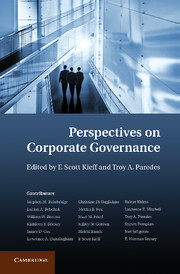Book contents
- Frontmatter
- Contents
- Contributors
- Acknowledgments and Dedication
- PERSPECTIVES ON CORPORATE GOVERNANCE
- Introduction
- PART ONE THE BOARD OF DIRECTORS AND THE CEO
- PART TWO THE WHY, WHEN, HOW, AND HOW MUCH OF EXECUTIVE PAY
- PART THREE CONSTRAINING MANAGERS AND DIRECTORS: INVESTORS, SECURITIES REGULATION, AND THE MEDIA
- PART FOUR DELAWARE VERSUS CONGRESS: ON THE FEDERALIZATION OF CORPORATE GOVERNANCE
- 10 How Delaware Law Can Support Better Corporate Governance
- 11 Federalism versus Federalization: Preserving the Division of Responsibility in Corporation Law
- PART FIVE COMPARATIVE CORPORATE GOVERNANCE
- Epilogue: Three Secular Trends of Corporate Law
- Index
- References
11 - Federalism versus Federalization: Preserving the Division of Responsibility in Corporation Law
Published online by Cambridge University Press: 04 August 2010
- Frontmatter
- Contents
- Contributors
- Acknowledgments and Dedication
- PERSPECTIVES ON CORPORATE GOVERNANCE
- Introduction
- PART ONE THE BOARD OF DIRECTORS AND THE CEO
- PART TWO THE WHY, WHEN, HOW, AND HOW MUCH OF EXECUTIVE PAY
- PART THREE CONSTRAINING MANAGERS AND DIRECTORS: INVESTORS, SECURITIES REGULATION, AND THE MEDIA
- PART FOUR DELAWARE VERSUS CONGRESS: ON THE FEDERALIZATION OF CORPORATE GOVERNANCE
- 10 How Delaware Law Can Support Better Corporate Governance
- 11 Federalism versus Federalization: Preserving the Division of Responsibility in Corporation Law
- PART FIVE COMPARATIVE CORPORATE GOVERNANCE
- Epilogue: Three Secular Trends of Corporate Law
- Index
- References
Summary
An efficient division of responsibility and the specialization that necessarily accompanies it lie at the heart of any successful business enterprise. The same principle applies with equal force to the institutions charged with regulating those enterprises or adjudicating their conduct. Since the enactment of the Securities Exchange Act of 1934 (1934 Act), the prevailing division of responsibility in the United States has broadly followed a federal model: the federal government has limited itself (with important exceptions) to disclosure issues in regulating the flow of information from public corporations to the securities markets, and the states have established the legal framework governing a firm's internal affairs. There is also a third, ambiguous area that some describe as the regulation of voting procedure. That is a term that has some surface legitimacy, but there is a concern that it may sometimes be used as a bootstrap argument for increased federalization.
The division of authority between federal disclosure regulation and state primacy over internal affairs naturally led to the evolution of specialized institutions to govern different facets of business. The federal government, particularly the Securities and Exchange Commission, developed an elaborate regulatory apparatus devoted to monitoring and controlling the disclosure of information to the markets. For their part, state lawmakers defined the rights and obligations of a firm's owners and managers, as well as governing state disclosure issues.
- Type
- Chapter
- Information
- Perspectives on Corporate Governance , pp. 351 - 396Publisher: Cambridge University PressPrint publication year: 2010



